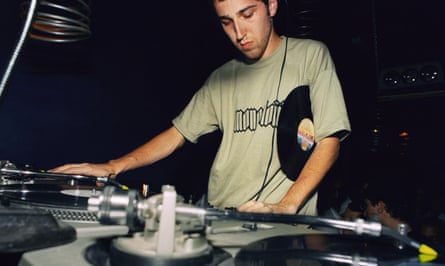On 1 January 2000, childhood friends Thomas Bangalter and Guy-Manuel de Homem-Christo decided to become robots. For the release of their second album, Discovery, the Daft Punk duo enlisted Hollywood effects designer Tony Gardner to fit them with helmets and articulated gloves, which they would then unveil in a photoshoot for the Face magazine and wear in public unfailingly until their split in 2021.
Like Discovery – a gilded, chart-bound spaceship built from shreds of 80s pop, funk and metal – the robots offered us a very retro vision of the future. Bangalter, taller, in the silver helmet, was convinced that the human-machine interface had gone haywire. “The difference between reality and fiction is gone,” he told NME in 2001. “You’ve got Photoshop, deformed images, a speech of the president of America that says things he’s never said, animatronics, androids. You can’t believe what you see on television any more.”
That prescient take was half a lifetime ago – and now the 48-year-old has unplugged his LED helmet for good. Two years after Daft Punk’s power-down, he’s releasing his first new material: Mythologies, an orchestral ballet score for the French classical label Erato. There are no synths, no disco samples – not even electricity. It’s a “carbon-friendly approach”, Bangalter says wryly. “This thing can be performed with just the breathing of the musicians and the dancers.”
Mythologies is the score for a sequence of dances inspired by tales from ancient Greece – the minotaur, the Amazons, Queen Thalestris – and choreographed by French ballet doyen Angelin Preljocaj, who has previously danced to the electronic music of Laurent Garnier, Air, Karlheinz Stockhausen and indeed Daft Punk. The commission dates back to 2019: Bangalter found himself writing during the pandemic, a project that was “definitely lockdown-compatible”. He restricted himself to working without an instrument, just pen and paper (as well as, he admits, a laptop running basic notation software). “The question about technology, even in its absence, is very present for me,” says the ex-robot. “I was for all these years a little bit overwhelmed by the daily constant interaction with technology.”
Bangalter is in London for a rare round of interviews, looking nothing like a six-time Grammy winner in a cosy, neutral jumper and a fringing of fluffy curls inherited from his dad, record producer Daniel Vangarde. The D.I.S.C.O mastermind was an important showbiz role model for early Daft Punk, yet the rarefied world of ballet was equally accessible to young Thomas, whose mother and aunt were both dancers.
Growing up in artsy Montmartre, Bangalter had by his late teens joined a cohort of Parisian club kids who were setting the “French touch” sound in motion, splicing old disco samples with the jacking energy of Chicago house. His generation will, he thinks, always prefer knobs and faders to slick computer interfaces. Ironically, Mythologies is one of the only times he’s made music with a laptop – but, he says, of his monastic desk setup, “there were no menus or timelines or computer screens or pop-ups or anything that would distract from the blank page”.
Disconnecting helped put him in the mythological mindset, looking for a sound that might be both ancient and timeless, somehow future-proofed. He remembers being in a club in New Orleans when a brass band started blasting a Rihanna song at 3am – the type of visceral experience that “could have happened 500 years ago, or could happen in 500 years, in a post-apocalyptic world”.
Guided by classic textbooks on orchestration, a loosely romantic score began to emerge, reflecting the folkloric content of the ballet and some recurring themes from the Daft Punk songbook. In contrast to the robot shtick, many of the duo’s most powerful songs were soaring monuments to sublime human emotion: think the headbanging The Prime Time of Your Life, the mooning loops of Digital Love, even the wayward croon of Todd Edwards on Fragments of Time. Mythologies has a few big moods of its own: the theme of Le Minotaure is full of parp and bluster.
Composing for orchestra isn’t new for Bangalter, who teamed up with a Hollywood arranger to execute Daft Punk’s hybrid film score for Tron: Legacy in 2010. “In Tron, the tough thing was always the discipline, the rigidity of making music to picture,” he says. With Mythologies, “I had more like carte blanche – the choreographer had given me freedom to do it with the timings that I had in my head.”
after newsletter promotion

The Tron score was in post-production for months after an intense four-day recording session, yet the process for Mythologies was “even crazier”: the orchestra had just two days to rehearse before the premiere at the Opéra National de Bordeaux. “It is definitely the opposite of electronic music-making, when you can do things on the fly or work for months on production,” he says. Working with real live humans in the orchestra was scary in all the right ways, and much more interesting to Bangalter than working out how to program another synth.
At the turn of the millennium, he was operating at the cutting edge of dance music: setting the benchmark for French touch on his Roulé label, inspiring a new wave of Paris club kids like Justice and SebastiAn, releasing Stardust’s Music Sounds Better With You and settling the template for imitators including Eric Prydz and Music-era Madonna. Yet beneath the pop innovation, Daft Punk were always a bit of an anachronism. After Homework, they seemed to be travelling backwards in time, first to sample-crunching disco homage, then into the analogue warmth of 2013 album Random Access Memories.
Did the future lose its allure at some point? “It’s interesting,” he ponders. “You either have the content or the form. Every artist wants to create their own little revolution and try to do things that haven’t been done. That’s kind of the punk aspect. But you ultimately become a caricature of yourself once you succeed.” The point, he says, is to do something different every time. “It works in opposition. These robots, they’re like the glorification of technology. But even in 2005, when we made this film Electroma, they wanted to become human. It’s human nature – the grass is always greener on the other side.”
Random Access Memories, Daft Punk’s final album, was about “taking the side of human beings rather than the machines” once and for all. They spent four years and more than $1m making their homage to a bygone era of big, expensive studio albums, the likes of which we may never see again. Bangalter remembers it as a “very crazy space-time continuum experience about interacting with your childhood”, a one-off collaboration with his musical heroes: Chic’s Nile Rodgers, Eurodisco originator Giorgio Moroder and Hollywood composer Paul Williams. “There was this ability, because the timing was right, to do something together and to possibly transmit it,” he says. “It was a record that could not happen before or after. A generational transmission.”
As a father to sons aged 14 and 21, Bangalter is only too aware that we’re living through a wave of nostalgia for the 90s – a golden era for French club music, when artists such as Étienne de Crécy, Alan Braxe and DJ Falcon were filtering vintage loops into euphoric nu-disco nuggets. “It was an amazing time,” he reflects. “I was 20 in 1995. There was a sense of experimenting, a lot of possibilities, and also this network of record shops and labels between all these capitals of the world. It was beautiful because it was decentralised. It carried all the optimism and utopia of what the next steps could be, and how the internet started to be this kind of anarchic, crazy, free zone.”

We’re no longer so naive, of course – but Daft Punk were bearish on the future 20 years ago, back when Bangalter was freaking out about Photoshop. “I’m not scared of technology,” he counters. “I’m more scared of the nature of our relationship with technology and how it can dominate us. I’ve always liked the idea of us being able to control technology, to dominate it as artists in order to express things.” That job is getting harder, though, as the world is “saturated with so many options”.
Mythologies introduced him to the joys of doing one thing at a time, “sticking to this idea of being the composer”, he says, “because for 25 years or more I was constantly multitasking”. Daft Punk’s legacy was multimedia, multiplatform, multi-everything – encompassing iconic MTV moments, feature-length films, a trailblazing online fanclub, one colossal LED pyramid and a legendary Coachella set, the last two we can, in retrospect, blame for the worst excesses of 2010s EDM.
Where does Bangalter feel Daft Punk’s influence now? “There used to be a lot of barriers between genres of music. I was hopeful there was a possibility to break these. That was part of the message of what we did musically.” Pop tribalism is indeed over, and while that can’t be credited to Daft Punk alone – piracy, streaming and three decades of internet did their bit – his hunch was once again correct.
“In some way the world is much more polarised now, but not really musically – musically there is this ability to mix and match and create levels of conflicting aesthetics or clashing ideas. I just hope that the tolerance existing right now in music will exist more in society as well.” The defecting robot has one more warning: “Now there is an urgency to somehow bend the algorithms.”

